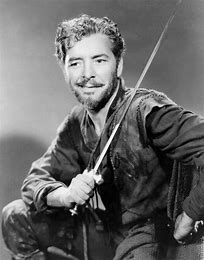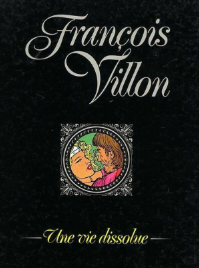This is the fifth part of Balladeer’s Blog’s look at the swashbuckling legends that surround Francois Villon (1431-1463?), remembered as one of France’s greatest poets and a notorious outlaw.
 FRANCOIS VILLON PART FIVE – We left off last time with Villon on the run again, having fled Paris after the Navarre College job in which he and his fellows robbed a record amount of gold for the time period.
FRANCOIS VILLON PART FIVE – We left off last time with Villon on the run again, having fled Paris after the Navarre College job in which he and his fellows robbed a record amount of gold for the time period.
Formerly, despite his criminal career most of the notoriety Francois had earned was for his scandalous, irreverent poetry regarding The Powers That Be in France of his era. The December 20th, 1456 Navarre caper changed that.
 From early 1457 and for a few years more, Villon continued his outlaw existence in and around the French province of Anjou and the Loire River Valley. Depending on the source, Francois either officially became a member of the criminal fraternity called the Coquillards at this time or was already a member and deepened his ties to them.
From early 1457 and for a few years more, Villon continued his outlaw existence in and around the French province of Anjou and the Loire River Valley. Depending on the source, Francois either officially became a member of the criminal fraternity called the Coquillards at this time or was already a member and deepened his ties to them.
Falling in with a gang of highwaymen, Villon helped prey on the carriage trade, which enhanced his underdog/ quasi-Robin Hood reputation because only the wealthy and the high-born traveled by carriage in that era. No one else could afford to.
Some romantic embellishments claim Villon led a gang of his own, but he never made that claim and seems to have instead been a rank-and-file sword-wielding member of an established band of highway robbers. Still, he would have shared in the plundered gold, silver, precious gems and ivory.
If pickings were slim on the highways, Francois could temporarily join up with smugglers or counterfeiters and forgers. Remember, by some accounts he had forged his own pardon after killing a priest in a duel over a woman years earlier, so if true he would have had experience.
 Our poet’s nights would have been spent around campfires with his outlaw brethren, or at brothels and out of the way inns or taverns. At those inns or taverns, Francois and company spent wildly on wine & women, fenced and gambled.
Our poet’s nights would have been spent around campfires with his outlaw brethren, or at brothels and out of the way inns or taverns. At those inns or taverns, Francois and company spent wildly on wine & women, fenced and gambled.
One of our man’s poems regarding the outlaw lifestyle was titled Good Advice to Those of Evil Life. With tongue in cheek Villon offered advice to fellow rogues who forever bemoaned their own careless spending with verses lamenting “Where do our purses ever stray?/ All to taverns and saucy tarts.”
Francois was insightful enough to realize that those he was warning would ignore such advice as thoroughly as he did himself. The closing four lines of this wry twenty-line piece were “The doublet that bright chevrons splay/ The cloak that over new tights parts/ Go, e’er a wanton reads this lay/ All to taverns and saucy tarts.”
Though his own criminal activities were mostly by choice at this particular time in his life, Villon never lost sight of the fact that the poor often had no alternative but crime simply to survive. One of the most quoted selections from Francois’ volumes of verse was “Necessity makes men defy the law/ As hunger drives wolves from the forest and into the towns.”
 This period from the late 1450s was when Villon penned the surviving poems in the criminal slang of the Coquillards and whose coded meaning is still debated to this very day. Among these works in the jargon were the infamous “Thieves’ Dozen” of eleven poems depicting life among the lawless.
This period from the late 1450s was when Villon penned the surviving poems in the criminal slang of the Coquillards and whose coded meaning is still debated to this very day. Among these works in the jargon were the infamous “Thieves’ Dozen” of eleven poems depicting life among the lawless.
There is debate over whether or not Villon wrote all of them, with some scholars ruling out Francois’ hand in a few of the Thieves’ Dozen but crediting our man with seven of the eleven.
At any rate, the outlaw poet’s next verifiable (-ish) activities found him an honored guest in the castle of Duke Rene of Anjou, who was noted for his interest in literature, the arts and science. This accounted for his willingness to figuratively “slum” with a man of Villon’s controversial reputation.
I’ll cover that period next time.

Francois was an interesting character I guess well shared. Waiting for ending part.
Thank you very much! I appreciate it!
☺️
😀
Ah, then you must mind carefully the reading of my posts, lest you be associated poorly.
Sage advice, Espy. Thanks!
Having lived all over Texas, Louisiana, and New Mexico, I have had brushes with Mexican Spanish, Cajun French, and (mostly) Deutsch from friends and reletaves. So how would one pronounce “Villon?” Would the L be silent?
Oh, yeah. And I also know some English.
Ha! That is amazing!
It’s pronounced like Veeyone.
I’m loving this series. It’s great that an outlaw can also be a renowned poet. This wouldn’t be the first time that happened either
Thank you for saying so! I know what you mean, there’s always popular appeal about such stories, both before Villon and after.